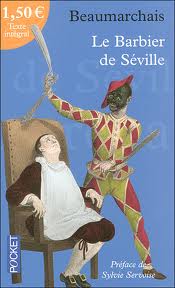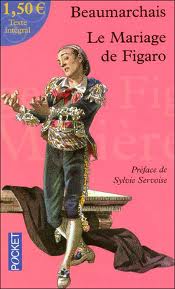Pierre-Augustin Caron De Beaumarchais, French playwright: Difference between revisions
No edit summary |
Jackie Sider (talk | contribs) No edit summary |
||
| (One intermediate revision by one other user not shown) | |||
| Line 8: | Line 8: | ||
---- | ---- | ||
[[File:Seville.jpg|left]] | [[File:Seville.jpg|left]] | ||
'''Artist:''' Pierre-Augustin Caron De Beaumarchais 1732 - 1799 | '''Artist:''' Pierre-Augustin Caron De Beaumarchais (1732 - 1799) | ||
'''Confronting Bodies:''' Censors, Parlement and Louis XVI of France | '''Confronting Bodies:''' Censors, Parlement and Louis XVI of France | ||
| Line 20: | Line 20: | ||
'''The Incident:''' In 1773 Beaumarchais was invited to perform ''The Barber of Seville'' at the Comedie Francaise, however the invitation was retracted and Beaumarchais was imprisoned for satirizing the Duc de Chaulnes. His play ''Memoirs'' was burned because it contained "scandalous charges" against the magistracy and members of Parlement. ''The Barber of Seville'' was banned and re-worked several times before it was finally allowed to show in 1775. ''The Marriage of Figaro'' met similar trouble. It was scheduled to run in 1781, however, King Louis XVI personally declared that the play would never be performed. In 1779 Beaumarchais left France for Germany with the intention of publishing Voltaire's writings. His project was successful, but religious and government officials banned advertising for his collection in France. <P> | '''The Incident:''' In 1773 Beaumarchais was invited to perform ''The Barber of Seville'' at the Comedie Francaise, however the invitation was retracted and Beaumarchais was imprisoned for satirizing the Duc de Chaulnes. His play ''Memoirs'' was burned because it contained "scandalous charges" against the magistracy and members of Parlement. ''The Barber of Seville'' was banned and re-worked several times before it was finally allowed to show in 1775. ''The Marriage of Figaro'' met similar trouble. It was scheduled to run in 1781, however, King Louis XVI personally declared that the play would never be performed. In 1779 Beaumarchais left France for Germany with the intention of publishing Voltaire's writings. His project was successful, but religious and government officials banned advertising for his collection in France. <P> | ||
'''Results of Incident:''' Beaumarchais earned recognition outside of France | '''Results of Incident:''' Although Beaumarchais earned recognition outside of France, he always met adversity from bourgeois audiences. <P> | ||
'''Source:''' Censorship, A World Encyclopedia, ed. D. Jones | '''Source:''' Censorship, A World Encyclopedia, ed. D. Jones | ||
Latest revision as of 16:55, 3 February 2012
Date: 1770 - 1780s
Region: Europe
Subject: Political/Economic/Social Opinion
Medium: Theatre
Artist: Pierre-Augustin Caron De Beaumarchais (1732 - 1799)
Confronting Bodies: Censors, Parlement and Louis XVI of France
Dates of Action: 1770-1780s
Location: France
Description of Artwork: Beaumarchais's work satirized the French government. He is best know for his plays, The Barber of Seville and The Marriage of Figaro. Both plays allude to peasant uprising, and corrupt government and church officals.
The Incident: In 1773 Beaumarchais was invited to perform The Barber of Seville at the Comedie Francaise, however the invitation was retracted and Beaumarchais was imprisoned for satirizing the Duc de Chaulnes. His play Memoirs was burned because it contained "scandalous charges" against the magistracy and members of Parlement. The Barber of Seville was banned and re-worked several times before it was finally allowed to show in 1775. The Marriage of Figaro met similar trouble. It was scheduled to run in 1781, however, King Louis XVI personally declared that the play would never be performed. In 1779 Beaumarchais left France for Germany with the intention of publishing Voltaire's writings. His project was successful, but religious and government officials banned advertising for his collection in France.
Results of Incident: Although Beaumarchais earned recognition outside of France, he always met adversity from bourgeois audiences.
Source: Censorship, A World Encyclopedia, ed. D. Jones

